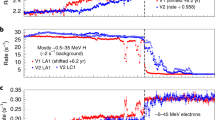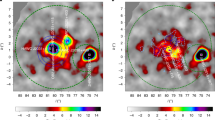Abstract
IT seems quite certain that it is not possible to explain all the effects of cosmic rays by means of a single corpuscular component. On the other hand, the results of the direct measurements of the energy of the rays, by their curvature in a magnetic field, are difficult to reconcile with the existence of any simple relation between their energy and penetrating power. I want, therefore, to suggest a dualistic theory of the cosmic rays, based on the existence of two primary components, both of great energy, but which are absorbed very differently by matter1.
This is a preview of subscription content, access via your institution
Access options
Subscribe to this journal
Receive 51 print issues and online access
$199.00 per year
only $3.90 per issue
Buy this article
- Purchase on Springer Link
- Instant access to full article PDF
Prices may be subject to local taxes which are calculated during checkout
Similar content being viewed by others
References
P. Auger, C.R., 200, 739; 1935.
P. Auger, A. Rosenberg and F. Bertein, C.R., 200, 1027; 1935.
Author information
Authors and Affiliations
Rights and permissions
About this article
Cite this article
AUGER, P. Nature of Cosmic Rays. Nature 135, 820–821 (1935). https://doi.org/10.1038/135820b0
Issue Date:
DOI: https://doi.org/10.1038/135820b0
Comments
By submitting a comment you agree to abide by our Terms and Community Guidelines. If you find something abusive or that does not comply with our terms or guidelines please flag it as inappropriate.



